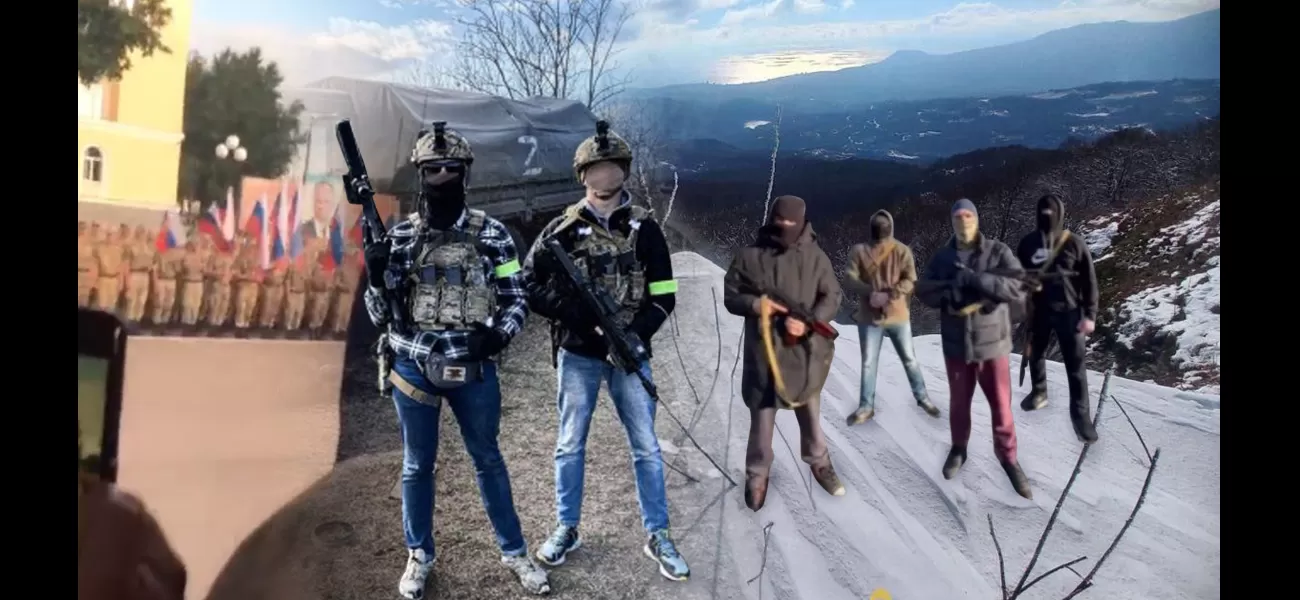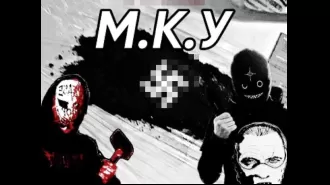Ukraine's secret agents have successfully infiltrated Putin's invading troops.
Kyiv's operators are embarking on dangerous missions in hostile territory.
April 6th 2024.

Since Russia began its aggressive invasion of Ukraine, Ukrainian special forces and partisans have been actively involved in resisting and fighting back against the occupation. These brave individuals, operating in secrecy, are risking their lives to defend their country from the shadows.
One notable organization, known as the Atesh group, has been sharing pictures and information about Russian troops and their deficiencies in domestic air defense. They have also been carrying out various acts of resistance, ranging from peaceful civil disobedience to more aggressive actions such as assassinations and sabotages.
As Moscow gains ground on the battlefield, Ukrainian special forces have revealed to The Agency their involvement in supporting and leading the partisan movement within occupied territory. These guerilla fighters, believed to be civilians or military veterans, have been responsible for mysterious explosions, assassinations, and sabotages, including derailing trains.
Despite the danger they face, the resistance movement continues to carry out missions, such as reconnaissance of air and naval bases and destroying key installations. They have even managed to infiltrate the ranks of the invading forces, gathering valuable intelligence for the Ukrainian army.
Lieutenant Colonel Oleksandr Kindratenko, a spokesperson for Ukraine's Special Operations Forces, confirmed their role in organizing and training the partisan units. He also mentioned their successes in disrupting enemy operations, such as blowing up a railway track in the occupied city of Melitopol.
The respected US Institute for the Study of War has been tracking and documenting the various acts of resistance carried out by the partisans. These include arson, sabotage, and targeted violence using small arms.
The resistance movement is not limited to violent actions, as non-violent civil resistance is also taking place in Russian-occupied areas. The peaceful Yellow Ribbon group has reported looting, killing, and kidnapping by the occupiers, prompting civilians to resist in their own ways.
The Ukrainian special forces have also been involved in high-profile operations, such as the missile strike on Russia's Black Sea Fleet headquarters in occupied Crimea and the assassination of a local branch executive secretary of Putin's United Russia party.
There have also been unclaimed attacks inside Russia's lawful borders, targeting air bases, military aircraft, railway lines, and oil refineries. Just recently, uncrewed aerial vehicles were used to strike an oil factory and a manufacturing facility for Iranian drones, hundreds of miles inside Russia.
Even Russian partisans, like the Freedom of Russia Legion, have joined in the resistance, carrying out cross-border raids into Belgorod. According to George Barros, the ISW's Russia team lead, this tradition of resistance dates back to the 1930s and 1940s when Ukraine was under Soviet occupation.
Despite the danger and challenges they face, the Ukrainian special forces, partisans, and civilian resistance continue to stand strong against the Russian invasion. Their bravery and determination serve as a reminder that the fight for freedom and sovereignty is never easy, but always worth it.
For years, Ukrainian special forces and partisans have been bravely fighting against the Russian invasion. Despite the danger, these individuals have taken up the cause from the shadows, risking their lives to resist the occupation of their country. One of the most active organizations, known as Atesh, has even shared photos of troops at a military parade with Putin's image in the background. They have also exposed flaws in Russia's air defense system.
But Atesh is just one part of a larger movement, which includes everything from peaceful protests to violent acts of disobedience. As Moscow continues to gain ground on the battlefield, Ukrainian special forces have revealed to us their crucial role in supporting the partisans operating in the occupied territories. These guerrilla fighters are responsible for various acts of sabotage, such as derailing trains and carrying out assassinations, all in an effort to hinder the Russian forces.
These brave individuals, who are often civilians or veterans, face the constant threat of being caught by Putin's forces. Yet, they continue to gather intelligence and carry out dangerous missions, including infiltration into the ranks of the Russian invasion forces. A spokesperson for Ukraine's Special Operations Forces shared that their elite unit has been at the forefront of this resistance, playing a leading role in organizing and training the partisan units.
At the same time, the respected US Institute for the Study of War has been documenting the various acts of resistance taking place during the Russian invasion. These include arson, sabotage, and targeted violence using small arms. Lieutenant Colonel Oleksandr Kindratenko, who leads the Ukrainian Special Operations Forces, explained that the goal of these actions is to disrupt the enemy's personnel, equipment, and communication.
One notable operation carried out by the resistance movement was the destruction of a railway track in the occupied city of Melitopol. This not only hindered the movement of Russian troops, but it also damaged a train delivering ammunition and fuel to the enemy. However, these brave actions often go unnoticed, as the partisans must remain covert in order to protect their lives.
The resistance movement has also been responsible for high-profile operations, such as the missile strike on Russia's Black Sea Fleet headquarters in occupied Crimea. And although they do not take credit for it, the partisans were also behind the assassination of a local branch executive secretary of Putin's United Russia party. This peaceful Yellow Ribbon group also reports non-violent resistance in the occupied territories, as the Russian forces continue to commit crimes such as looting, killing, and kidnapping.
But the resistance goes beyond the borders of occupied Ukraine. There have been unclaimed attacks on targets inside Russia, including air bases, military aircraft, railway lines, and oil refineries. Just this week, uncrewed aerial vehicles were used to strike an oil factory and a drone manufacturing facility in Russia's Tatarstan Republic, over 700 miles inside the country. The resistance even extends to cross-border raids into Belgorod, carried out by groups like the Freedom of Russia Legion.
According to George Barros, the Russia team lead at the US Institute for the Study of War, this partisan movement is a continuation of Ukraine's long history of resistance against Russian oppression. He noted that even as far back as the 1930s and 1940s, there were active partisan movements in Soviet-occupied Ukraine, all in an effort to defeat the Russians.
Despite the overwhelming power of the Russian forces, the Ukrainian resistance continues to fight for their country's freedom. They operate in the shadows, risking their lives every day, and their efforts may go unnoticed, but their impact is undeniable. We stand in solidarity with them and continue to follow their courageous actions as they fight for their homeland.
One notable organization, known as the Atesh group, has been sharing pictures and information about Russian troops and their deficiencies in domestic air defense. They have also been carrying out various acts of resistance, ranging from peaceful civil disobedience to more aggressive actions such as assassinations and sabotages.
As Moscow gains ground on the battlefield, Ukrainian special forces have revealed to The Agency their involvement in supporting and leading the partisan movement within occupied territory. These guerilla fighters, believed to be civilians or military veterans, have been responsible for mysterious explosions, assassinations, and sabotages, including derailing trains.
Despite the danger they face, the resistance movement continues to carry out missions, such as reconnaissance of air and naval bases and destroying key installations. They have even managed to infiltrate the ranks of the invading forces, gathering valuable intelligence for the Ukrainian army.
Lieutenant Colonel Oleksandr Kindratenko, a spokesperson for Ukraine's Special Operations Forces, confirmed their role in organizing and training the partisan units. He also mentioned their successes in disrupting enemy operations, such as blowing up a railway track in the occupied city of Melitopol.
The respected US Institute for the Study of War has been tracking and documenting the various acts of resistance carried out by the partisans. These include arson, sabotage, and targeted violence using small arms.
The resistance movement is not limited to violent actions, as non-violent civil resistance is also taking place in Russian-occupied areas. The peaceful Yellow Ribbon group has reported looting, killing, and kidnapping by the occupiers, prompting civilians to resist in their own ways.
The Ukrainian special forces have also been involved in high-profile operations, such as the missile strike on Russia's Black Sea Fleet headquarters in occupied Crimea and the assassination of a local branch executive secretary of Putin's United Russia party.
There have also been unclaimed attacks inside Russia's lawful borders, targeting air bases, military aircraft, railway lines, and oil refineries. Just recently, uncrewed aerial vehicles were used to strike an oil factory and a manufacturing facility for Iranian drones, hundreds of miles inside Russia.
Even Russian partisans, like the Freedom of Russia Legion, have joined in the resistance, carrying out cross-border raids into Belgorod. According to George Barros, the ISW's Russia team lead, this tradition of resistance dates back to the 1930s and 1940s when Ukraine was under Soviet occupation.
Despite the danger and challenges they face, the Ukrainian special forces, partisans, and civilian resistance continue to stand strong against the Russian invasion. Their bravery and determination serve as a reminder that the fight for freedom and sovereignty is never easy, but always worth it.
For years, Ukrainian special forces and partisans have been bravely fighting against the Russian invasion. Despite the danger, these individuals have taken up the cause from the shadows, risking their lives to resist the occupation of their country. One of the most active organizations, known as Atesh, has even shared photos of troops at a military parade with Putin's image in the background. They have also exposed flaws in Russia's air defense system.
But Atesh is just one part of a larger movement, which includes everything from peaceful protests to violent acts of disobedience. As Moscow continues to gain ground on the battlefield, Ukrainian special forces have revealed to us their crucial role in supporting the partisans operating in the occupied territories. These guerrilla fighters are responsible for various acts of sabotage, such as derailing trains and carrying out assassinations, all in an effort to hinder the Russian forces.
These brave individuals, who are often civilians or veterans, face the constant threat of being caught by Putin's forces. Yet, they continue to gather intelligence and carry out dangerous missions, including infiltration into the ranks of the Russian invasion forces. A spokesperson for Ukraine's Special Operations Forces shared that their elite unit has been at the forefront of this resistance, playing a leading role in organizing and training the partisan units.
At the same time, the respected US Institute for the Study of War has been documenting the various acts of resistance taking place during the Russian invasion. These include arson, sabotage, and targeted violence using small arms. Lieutenant Colonel Oleksandr Kindratenko, who leads the Ukrainian Special Operations Forces, explained that the goal of these actions is to disrupt the enemy's personnel, equipment, and communication.
One notable operation carried out by the resistance movement was the destruction of a railway track in the occupied city of Melitopol. This not only hindered the movement of Russian troops, but it also damaged a train delivering ammunition and fuel to the enemy. However, these brave actions often go unnoticed, as the partisans must remain covert in order to protect their lives.
The resistance movement has also been responsible for high-profile operations, such as the missile strike on Russia's Black Sea Fleet headquarters in occupied Crimea. And although they do not take credit for it, the partisans were also behind the assassination of a local branch executive secretary of Putin's United Russia party. This peaceful Yellow Ribbon group also reports non-violent resistance in the occupied territories, as the Russian forces continue to commit crimes such as looting, killing, and kidnapping.
But the resistance goes beyond the borders of occupied Ukraine. There have been unclaimed attacks on targets inside Russia, including air bases, military aircraft, railway lines, and oil refineries. Just this week, uncrewed aerial vehicles were used to strike an oil factory and a drone manufacturing facility in Russia's Tatarstan Republic, over 700 miles inside the country. The resistance even extends to cross-border raids into Belgorod, carried out by groups like the Freedom of Russia Legion.
According to George Barros, the Russia team lead at the US Institute for the Study of War, this partisan movement is a continuation of Ukraine's long history of resistance against Russian oppression. He noted that even as far back as the 1930s and 1940s, there were active partisan movements in Soviet-occupied Ukraine, all in an effort to defeat the Russians.
Despite the overwhelming power of the Russian forces, the Ukrainian resistance continues to fight for their country's freedom. They operate in the shadows, risking their lives every day, and their efforts may go unnoticed, but their impact is undeniable. We stand in solidarity with them and continue to follow their courageous actions as they fight for their homeland.
[This article has been trending online recently and has been generated with AI. Your feed is customized.]
[Generative AI is experimental.]
0
0
Submit Comment





